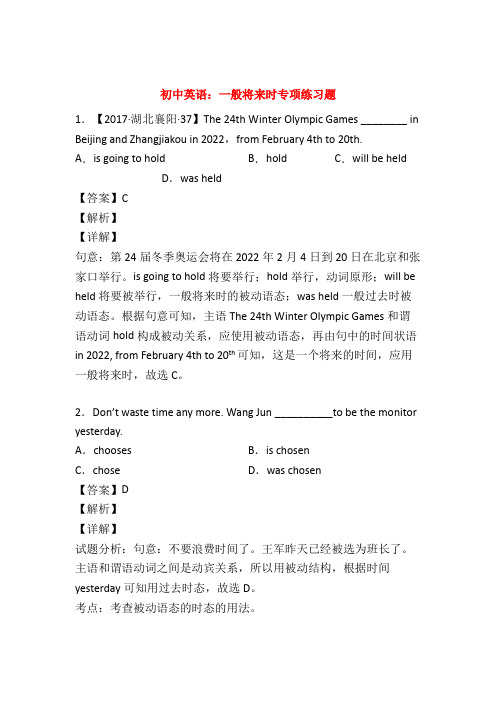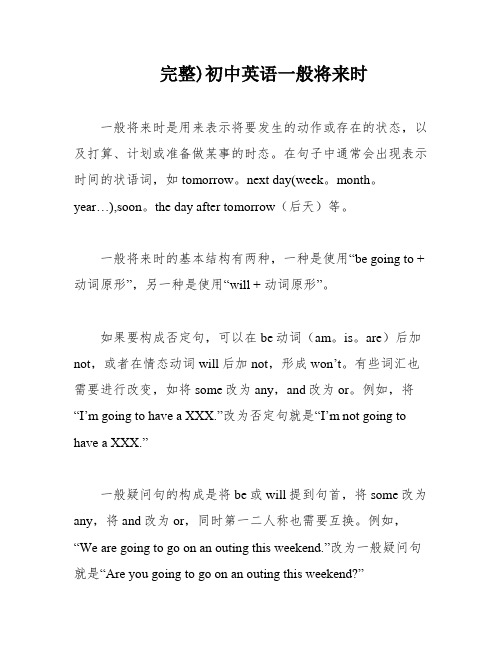初中一般将来时
初中英语语法-一般将来时练习题(含答案)

初中英语语法-一般将来时练习题(含答案)1.There will XXX.2.Charlie won't work here next month.3.He is very busy this week。
but he will be free next week.4.There will be a dolphin show in the XXX.5.Are you going to be free tomorrow。
No。
I will be free the day after tomorrow.6.Mother will give me a nice present on my next birthday.7.No。
please don't.8.I will get it for you at once。
1.明天下午将举行一次会议。
2.XXX下个月不会在这里工作。
3.他这周很忙,但下周会有空。
4.明天晚上动物园会有一场海豚表演。
5.你明天会有空吗?不,我后天会有空。
6.我的母亲会在我下一个生日给我一个好礼物。
7.不,请不要。
8.我会立刻拿给你。
9.XXX Saturday?10.If they show up。
we will hold a meeting.11.He will give her a beautiful hat on her next birthday.12.He will write to us as soon as he arrives there.13.He will come back in three days.14.If it doesn't rain tomorrow。
we'll go roller-skating.15.No。
they won't.16.Who will we go XXX?17.We will XXX.18.Tomorrow。
专项 初中英语语法 一般将来时练习题含答案50题

初中英语:一般将来时专项练习题1.As a new kind of transport service, public bicycles in more Chinese cities in the following years.A.use B.are used C.will use D.will be used 【答案】D【解析】【详解】句意:作为一种新型的交通服务,共享单车在接下来的几年里将会在中国更多的城市里使用。
use使用,动词原形;are used一般现在时的被动语态;will use一般将来时;will be used一般将来时的被动语态。
根据句中的时间状语in the following years可知,这里表示将来的事情,应用一般将来时态,并且句子的主语shared bikes和动词use构成被动关系,应用被动语态,故应选D。
2.—Who’ s the little girl in the picture? —It’s me. It at the age of 3. A.took B.is taken C.was taken【答案】C【解析】【详解】试题分析:句意:—照片中的这个小女孩是谁?—是我。
它是在三岁时照的。
主语it是动作take的承受者,故用被动语态;据at the age of 3可知句子用一般过去时,故句子要用一般过去时的被动语态。
故选C。
考点:考查一般过去时的被动语态。
3.World Leisure Congress(世界休闲大会) in Pinggu next year. A.hold B.is held C.will hold D.will be held 【答案】D【解析】【详解】句意:世界休闲大会将于明年在平谷举办。
hold举行,举办,动词原形;is held一般现在时的被动语态;will hold一般将来时;will be held一般将来时的被动语态。
初中一般将来时

一般将来时讲解与练习一、概念:表示将要发生的动作或存在的状态句中一般有以下时间状语:tonight,in the future,tomorrow, next day(week, month, year…),soon, the day after tomorrow (后天),in+段时间(在...之后)等。
二、基本结构:①主语+be going to + do;②主语+will+ do. ③主语(只能为I /We)+shall+do三、否定句:在①be动词(am, is, are)后加not;②will后加not 成won’t;③shall后加not成shan’t例如:I’m going to have a picnic this afternoon. → I’m not going to have a picnic this afternoon.四、一般疑问句:be或will或shall提到句首,some改为any, and 改为or,第一二人称互换。
例如:We are going to go for a walk this weekend.→ Are you going to go for a walk this weekend?五、对划线部分提问。
一般情况,一般将来时的对划线部分有三种情况。
1. 问人。
Who 例如:I’m going to New York soon. →Who’s going to New York soon.2. 问干什么。
What … do.例如: My father is going to watch a match with me this afternoon.→What is your father going to do with you this afternoon?3. 问什么时候。
When. 例如:She’s going to go to bed at nine. →When is she going to bed?六、同义句:be going to = willI am going to go swimming tomorrow. = I will go swimming tomorrow.七、be going to和will 的区别be going to和will 的用法虽然都表示将来发生动作或情况,但它们的用法是有区别的。
(语法专练)初中一般将来时练习题及答案50题

初中英语:一般将来时专项练习题1.【2017·湖北襄阳·37】The 24th Winter Olympic Games ________ in Beijing and Zhangjiakou in 2022,from February 4th to 20th.A.is going to hold B.hold C.will be heldD.was held【答案】C【解析】【详解】句意:第24届冬季奥运会将在2022年2月4日到20日在北京和张家口举行。
is going to hold将要举行;hold举行,动词原形;will be held将要被举行,一般将来时的被动语态;was held一般过去时被动语态。
根据句意可知,主语The 24th Winter Olympic Games和谓语动词hold构成被动关系,应使用被动语态,再由句中的时间状语in 2022, from February 4th to 20th可知,这是一个将来的时间,应用一般将来时,故选C。
2.Don’t waste time any more. Wang Jun __________to be the mo nitor yesterday.A.chooses B.is chosenC.chose D.was chosen【答案】D【解析】【详解】试题分析:句意:不要浪费时间了。
王军昨天已经被选为班长了。
主语和谓语动词之间是动宾关系,所以用被动结构,根据时间yesterday可知用过去时态,故选D。
考点:考查被动语态的时态的用法。
3.Some new schools in Nanjing in the near future, which satisfies the citizens'needs for more resources.A.were built B.are built C.will build D.will be built 【答案】D【解析】【详解】句意:在不久的将来,南京将新建一些学校,这将满足市民对更多资源的需求。
初中英语语法复习:一般将来时

初中英语语法复习:一般将来时一般将来时表示将来某一时刻的动作或状态,或将来某一段时间内经常的动作或状态。
常与一些表示将来的时间状语连用,如:tomorrow(明天),next week(下周),from now on(从现在开始);in the future(将来),in a few days等。
1、基本结构:be going to+动词原形 2. will+动词原形一般将来时:be going to+动词原形一般将来时:will+动词原形2. will 和be going to 的区别will 和be going to一般可以互用,但有时有区别:1)含时间和条件状语从句,如果主句是将来时,多用will.2)如果不是以人的意愿为转移,将来肯定会发生的动作和状态,多用will3)be going to根据迹象推测,有可能发生的事情或计划要做的事情。
3. there be 句型的一般将来式:1.There is/are going to be 2. There will be一、单项选择1.The old scientist ______ us a talk on future life next week.A.gives B.gave C.will give D.is giving2.—Jim, what are you going to do this weekend?—I ______ a movie with my dad.A.am watching B.watch C.watched D.am going to watch3.—Where’s mum?—She is trying on the new dress upstairs now. She _________ it to a party.A.wears B.wore C.will wear D.is wearing4.—What are you going to do next weekend?—There __________ a basketball match next Sunday. I want to watch it.A.will be B.will have C.is going to have D.are going to be 5.—Which team ________ the football match?—I’m not sure. The two teams both play well. Let’s wait and see.A.wins B.won C.is winning D.will win 6.Robots ________ us do some heavy and difficult jobs in the future.A.help B.helped C.are helping D.will help7.—What are you going to do next weekend, Wang Hui?—I ________ my grandparents next Sunday.A.visit B.visitedC.am visiting D.am going to visit8.I don’t know if it ________ sunny tomorrow. If it ________ sunny, I will go fishing. A.will be; is B.is; will beC.will be; is going to be D.is; is9.We are going to have a farewell party ________.A.now B.every day C.last week D.next Friday 10.There is going to ________ a basketball match tomorrow.A.be B.have C.is D.are11.Look at the dark clouds in the sky. It ________.A.is going to rain B.rained C.raining D.rainy 12.What ________you ________for tomorrow’s party?A.did; wear B.will; wear C.do; going to wear D.do; do13.He ________ busy this week. He ________ free next week.A.is; is B.will; will be C.is; will be14.There are many black clouds in the sky. It ________ soon.A.will rain B.rains C.rained D.is raining 15.It ________ warm in Dalian tomorrow.A.will be B.is C.does16.She will ________ a book about animals after school.A.buys B.buy C.is buy D.going to buy 17.Mike ________ his room yesterday, and he is going to ________ his homework tomorrow. A.cleaned; do B.cleaned; did C.clean; do18.—Our library is bright and beautiful.—Yes. Will you ________ us ________ it?A.shows; to B.show; aroundC.shows; around D.show; to19.Look! There are a lot of clouds in the sky. It is going to _______ soon.A.rains B.rainy C.be raining D.be rainy20.Li Ming ______ a T-shirt tomorrow.A.buys B.bought C.buy D.will buy 21.Sarah and I ______ a film next Sunday. We ______ horses last Sunday.A.am going to see; rode B.are going to see; rode C.will see; ride 22.—What are you going to do this weekend?—_______A.I’m going to visit my grandparents.B.I’m fine.C.I’m watching TV.D.I’m cleaning the room.23.—Peter! What is your plan for this Sunday?—I ________ my grandmother. She is in hospital.A.visit B.am visiting C.am going to visit 24.It’s cloudy all day today, but it ________ tomorrow.A.changes B.changed C.will change D.is changing 25.—Can your sister ________?—No, she can’t. But she ________ to swim next month.A.swims; is learning B.swim; is learningC.swims; is going to learn D.swim; is going to learn26.—When ________ you come back from London, Mary?—Last week. The River Thames is really beautiful and I ________ it again.A.do; visit B.did; visit C.do; am visiting D.did; will visit 27.This is our last night in China. We ________ home tomorrow.A.will fly B.fly C.flies D.flew 28.—Schools ________ different in the future.—Yes, you are right.A.is B.are C.were D.will be 29.—Why are you in a hurry, Cindy?—There ________ a basketball match between Class One and our class at 3 o’clock.A.are going to be B.will haveC.is going to have D.will be30.Tony _________ the Great Wall with his classmates next Sunday morning.A.visited B.visits C.will visit D.visit31.There ________ a sports meeting in our school next week.A.was B.were C.are D.is going to be 32.You can borrow this film—surely you _________ watching it.A.enjoy B.enjoyed C.will enjoy D.are enjoying 33.—Why are you in such a hurry, Peter?—I________ a basketball match between Class One and our class in ten minutes.A.join in B.am joining in C.joined in D.am going to join in 34.Robots and machines people do more work in the future.A.help B.will help C.are helping D.helped 35.After this exam, you ________ a wonderful holiday next month. Take it easy!A.have B.has C.had D.will have36.If it ______ rain tomorrow, my family ______ go for a walk in the park.A.isn’t, will B.doesn’t, willC.won’t, will D.won’t be, will37.—It’s hot here.—I ________ and open the window.A.go B.went C.am going D.will go 38.—When ________ Lingling ________ litter with her friend?—Next Saturday morning.A.does; collect B.did; collect C.will; collect D.is; collecting 39.Perhaps we ________ able to connect our minds to the Internet in the future.A.are B.were C.have been D.will be 40.—What’s your plan for the new term?—I ________ English well.A.learn B.learnedC.am learning D.am going to learn41.—Are you free? I’d like you to go to the museum with me.—Sorry, there _______ some important meetings this coming weekend.A.is going to have B.will have C.are going to be D.is going to be 42.There ________ schools in the future. Students will study at home.A.is going to have B.will be C.won’t have D.won’t be 43.—How will students learn then?—They ________ by computers in the classroom.A.studies B.studied C.will study D.is studying 44.—What are you going to do, Betty?—I’m going ________ football this afternoon.A.play B.to play C.played D.playing45.We hope ________ a computer on every student’s desk in the future.A.there is B.there wasC.there will have D.there will be46.—What are you going to do this Sunday?—I ________ a picnic with my parents.A.have B.had C.am having D.am going to have 47.We hope there ________ a war in the world. Everyone can live a happy life.A.will not have B.will be not C.is not going to be D.is not going to have 48.If you interview the estate agent, he ________ you much information about housing. A.gives B.gave C.will give D.is giving 49.—The radio says it ________ rain this afternoon, isn’t it?—No. I think it will be sunny.A.will go to B.is going to C.shall go to D.will be 50.Where __________ you __________ have a meeting tomorrow?A.do; go B.will; go C.are; go D.are; going to二、完成句子51.My mother will be back in an hour. (改为否定句)My mother back in an hour.52.The students will study at home in the future. (改为一般疑问句)the students at home in the future?53.Things will be different in the future. (变为一般疑问句)things in the future?54.There is a football match at the sports hall every day.(用tomorrow改写句子)a football match at the sports hall tomorrow.55.Alice is going to do her homework this afternoon. (改为—般疑问句)Alice her homework this afternoon?56.They are going to take a walk in the park. (就划线部分提问)they to in the park?57.They will meet at the school gate at 7 a.m. on Saturday. (对画线部分提问)they at the school gate?58.I’m going to learn English well because it’s very useful.(对划线部分提问)you going to learn English well?初中英语语法复习:一般将来时答案1.C【详解】句意:下周这位老科学家将给我们做一个关于未来生活的报告。
初中一般将来时讲解及练习

一般将来时1.用bedoing表示将来:主要意义是表示按计划、安排即将发生的动作,常用于位置转移的动词。
如:go,come,leave,arrive等,也可用于其他动作动词。
Wearehavingfishfordinner.Wearemovingtoadifferenthotelthedayaftertomorrow.这种用法通常带有表示将来的时间状语,如果不带时间状语,则根据上下文可表示最近即将发生的动作。
A:Whereareyougoing?B:Iamgoingforawalk.Areyoucomingwithme?A:Yes,Iamjustcoming.Waitforme.2.用begoingtodo表示将来:主要意义,一是表示“意图”,即打算在最近的将来或将来进行某事。
Areyougoingtopostthatletter?Howlongishegoingtostayhere?Iamgoingtobookaticket.另一意义是表示“预见”,即现在已有迹象表明将要发生或即将发生某种情况。
It’sgoingtorain.Georgeisputtingonw eight;heisgoingtobequitefat.3.用will/shalldo表示将来:一是表示预见Youwillfeelbetteraftertakingthismedicine.Doyouthinkitwillrain?二是表示意图.Iwillnotlendthebooktoyou.Takeiteasy,Iwillnotdoitanylonger.基本结构:Shewillcometohaveclasstomorrow.Willshecometohaveclasstomorrow?Shewon’tcometohaveclasstomorrow.Whatwillshedotomorrow?肯定形式:①am/is/aregoingto+do;②will/shall+do.否定形式:①am/is/aregoingnotto+do;②will/shallnot+do.一般将来时的时间状语时间状语:tonight今晚thedayaftertomorrow后天,thisevening今晚thisafternoon这个下午,thisSunday这个周日,thisweek这周,thismonth这个月,thisyear今年,nextweek下周,nextmonth 下个月,nextyear明年,tomorrowmorning明天早上,tomorrowafternoon明天下午,tomorrowevening明天晚上,intwodays两天之后,intwoweeks两周之后,intwoyears两年之后,later一会儿,soon很快,in20132013Itisgoingtorainsoon.后年theyearafternextinthemorningthedayaftertomorrow后天早上intheafternoonthedayaftertomorrow后天下午intheeveningthedayaftertomorrow后天晚上thismorning过去时thisafternoon过去时和将来时thisevening将来时一般将来时练习一、用所给动词的一般将来时填空1.I______(leave)inaminute.I______(finish)allmyworkbeforeI______(leave).2.—Howlong_____you_____(study)inourcountry??—I_____(plan)tobehereforaboutonemoreyear.?—I_____(hope)tovisittheotherpartsofyourcountry.?—What______you______(do)afteryou______(leave)here??—I______(return)homeand______(get)ajob.3.I______(be)tired.I______(go)tobedearlytonight.4.Mary’sbirthdayisnextMonday,hermother_____(give)herapresent.5.Itisverycoldthesedays.It______(snow)soon.6.—_____you_____(be)herethisSaturday??—No.I______(visit)myteacher.7.—______I______(get)youacopyoftoday’snewspaper??—Thankyou.8.Iamafraidthere______(be)ameetingthisafternoon.Ican’tjoinyou.9.Mike______(believe,not)thisuntilhe______(see)itwithhisowneyes.10.Mostofusdon’tthinktheirteam______(win).二、单项选择1.There__________ameetingtomorrowafternoon.????????A.willbegoingto???B.willgoingtobeC.isgoingtobe???D.willgotobe2.Charlie________herenextmonth.????????A.isn’tworking???B.doesn’tworkingC.isn’tgoingtoworking???D.won’twork3.He________verybusythisweek,he________freenextweek.????????A.willbe;is???B.is;is????C.willbe;willbe???D.is;willbe4.There________adolphinshowinthezootomorrowevening.????????A.was???B.isgoingtohaveC.willhave???D.isgoingtobe5.–________you________freetomorrow????–No.I________freethedayaftertomorrow.?????A.Are;goingto;will???B.Are;goingtobe;willC.Are;goingto;willbe???D.Are;goingtobe; willbe6.Mother________meanicepresentonmynextbirthday.????????A.willgives???B.willgive?????C.gives???D.give7.–ShallIbuyacupofteaforyou????–________.(不,不要。
(组合)初中英语语法 一般将来时练习题含答案50题

初中英语:一般将来时专项练习题1.The number of the old people is increasing in China. With the development of China, they _____ better care of in the future.A.will take B.are taken C.will be taken D.are taking 【答案】C【解析】【详解】句意“中国老年人的数量正在增加,随着中国的发展,将来他们会被很好的照顾”。
根据in the future可知,用一般将来时,排除B和D,且老年人和照顾之间为被动关系,故选C。
2.-Your school is so beautiful.--Thanks! A modern stadium and a big garden ______ to make it nicer this year.A.will be builtB.has been builtC.is built【答案】A【解析】【详解】试题分析:句意:――你学校是如此的美。
――谢谢,今天要修一个现代化的体育馆和一个大的花园,会使它更美。
今年将要修建,用一般将来时态,修建体育馆和花园,主语A modern stadium and a big garden是谓语动词build的承受者,用被动语态。
故选A。
【考点定位】考查动词的时态及语态辨析。
3.Be kind to others, or you won't ______ by them.A.respect B.respected C.be respected D.be respecting【答案】C【解析】【详解】句意:善待别人,否则你就得不到别人的尊重。
本题的主语you与respect之间存在着被动关系,因此应该用被动语态。
由won't可知,本题考查:一般将来时的被动语态,其结构是:will/shall be+动词的过去分词。
完整)初中英语一般将来时

完整)初中英语一般将来时一般将来时是用来表示将要发生的动作或存在的状态,以及打算、计划或准备做某事的时态。
在句子中通常会出现表示时间的状语词,如tomorrow。
next day(week。
month。
year…),soon。
the day after tomorrow(后天)等。
一般将来时的基本结构有两种,一种是使用“be going to + 动词原形”,另一种是使用“will + 动词原形”。
如果要构成否定句,可以在be动词(am。
is。
are)后加not,或者在情态动词will后加not,形成won’t。
有些词汇也需要进行改变,如将some改为any,and改为or。
例如,将“I’m going to have a XXX.”改为否定句就是“I’m not going to have a XXX.”一般疑问句的构成是将be或will提到句首,将some改为any,将and改为or,同时第一二人称也需要互换。
例如,“We are going to go on an outing this weekend.”改为一般疑问句就是“Are you going to go on an outing this weekend?”对于划线部分的提问,一般将来时的对划线部分有三种情况。
第一种是问人,可以使用Who,例如“I’m going to New York soon.”改为问句就是“Who’s going to New York soon?”第二种是问干什么,可以使用What … do,例如“My father is going to watch a race with me this after noon.”改为问句就是“What is your father going to do with you this afternoon?”第三种是问什么时候,可以使用When,例如“She’s going to go to bed at nine.”改为问句就是“When is she going to bed?”同义句的构成是将be going to改为will,例如“I am going to go XXX.”可以改为“I will go XXX.”最基本的一般将来时结构是使用“will + 动词原形”,例如“XXX.”表示明天他们将要参观博物馆。
